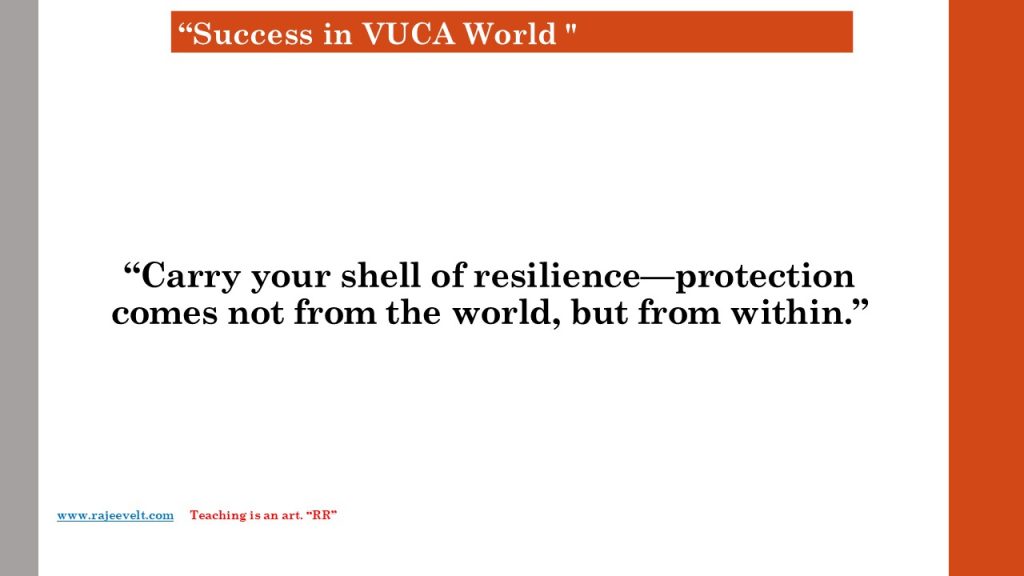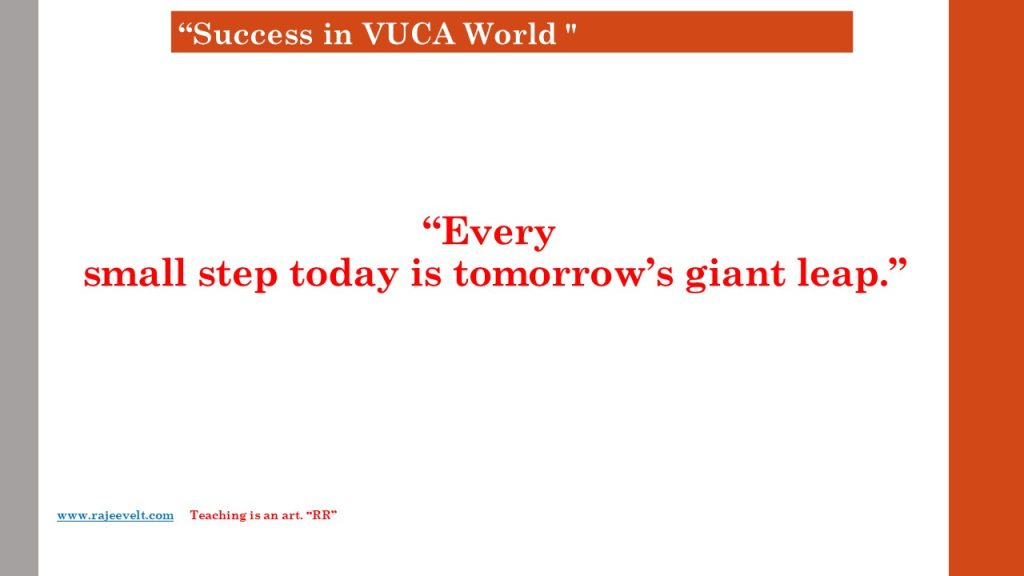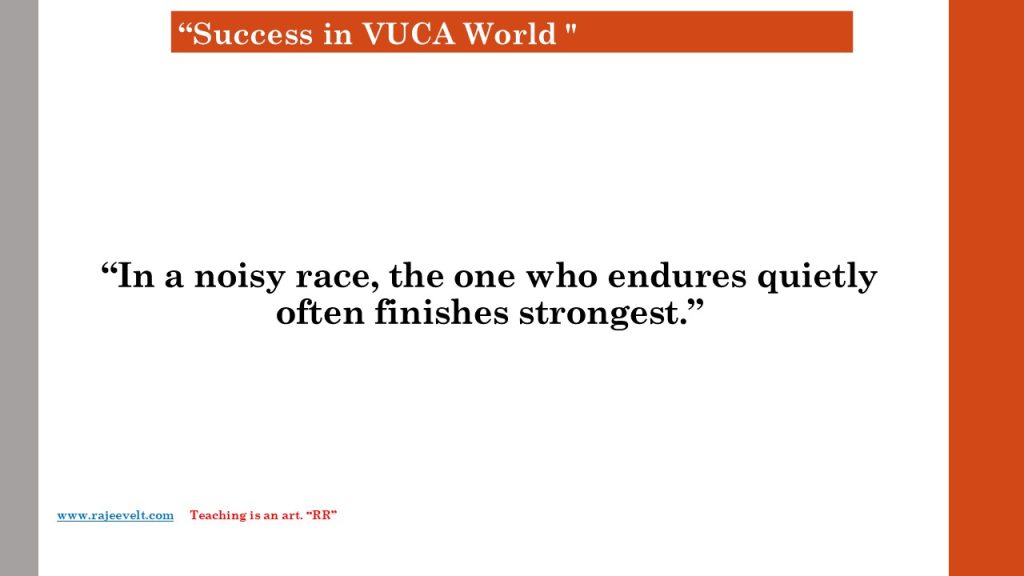
Turtle Theory to Succeed in the VUCA world
Ancient Wisdom for a Turbulent World
We are living in an age of volatility, uncertainty, complexity, and ambiguity—the world often described through the shorthand of VUCA—we are all searching for a philosophy that can give us strength, endurance, and clarity. The image of the turtle, slow yet steady, deliberate yet determined, offers lessons that have stood the test of centuries. The turtle has been revered as a symbol of wisdom, longevity, patience, and grounded resilience across cultures.
What is the Turtle Theory?
The Turtle Theory is not a singular doctrine authored by one thinker, but rather an idea that emerges from mythology, biology, and philosophy. It represents the belief that the qualities embodied by the turtle—patience, perseverance, self-protection, balance, and consistency—are essential for survival and success.
The turtles are viewed as bearers of the world and symbols of stability. The world is sometimes described as being supported on the back of a giant turtle (Kurma avatar of Vishnu) in Hindu mythology. The turtle is one of the four sacred animals, associated with wisdom and endurance in Chinese tradition. Native American stories also depict the earth as resting on a turtle’s back. These symbolic connections point to a timeless recognition: the turtle, though small and slow, carries within it immense strength, adaptability, and stability.
The Turtle Theory in modern terms can be described as the practice of living and leading with patience in action, protection of core values, and resilience in uncertainty. It is about knowing when to move forward with steadiness and when to retreat into the shell for reflection. It is not a call to slowness for its own sake, but to a measured pace that ensures sustainability and long-term success.
Importance of the Turtle Theory in Modern Times
The 21st century has brought unprecedented acceleration. We live in a world where information spreads instantly, markets fluctuate rapidly, and crises erupt without warning. The temptation is to move faster and faster in such an environment, as though speed alone were the answer to complexity. Yet this has created new challenges—stress, burnout, fractured relationships, and impulsive decisions.
The Turtle Theory stands out because it reminds us that survival and growth do not always belong to the fastest, but to the most adaptable. A turtle does not compete with a cheetah in running, but it endures storms, droughts, and changes in environment over millions of years.
The importance of this theory lies in four key dimensions:
- Patience in Growth – Turtles remind us that great achievements take time. Results are not always instant in business, education, relationships, and personal development. The Turtle Theory reinforces the idea of sustainable progress rather than short bursts of unsustainable effort.
- Resilience in Uncertainty – The turtle carries its home on its back, meaning it can adapt to new environments without losing its essence. In the same way, individuals and organizations need portable strengths—values, skills, and principles—that help them endure change.
- Balance Between Action and Retreat – A turtle knows when to extend its head and limbs to move and when to withdraw into its shell for safety. This balance is a metaphor for modern life: knowing when to take bold action and when to pause, reflect, or protect ourselves from harm.
- Longevity and Sustainability – Turtles are among the longest-living creatures. Their approach to life emphasizes energy conservation, steady progress, and balance with nature. This translates into sustainable lifestyles, ethical decision-making, and a long-term vision for humans.
The Turtle Theory offers a counterbalance to the hurried, restless energies of our times.


Benefits of the Turtle Theory
The benefits of adopting the Turtle Theory in daily life, leadership, and institutions are wide-ranging.
Enduring Relationships – In human connections, slow and steady effort builds trust and depth. The Turtle Theory nurtures relationships that are not transactional but lasting.
Clarity of Purpose –We can discover by slowing down enough to reflect what truly matters, avoiding distractions that come from constant urgency.
Reduced Stress – A turtle-like mindset helps us to handle challenges without panic. This reduces mental and emotional strain and contributes to healthier living.
Stronger Decision-Making – Deliberate patience often leads to better outcomes. A turtle-inspired leader takes time to assess, evaluate, and act wisely instead of reacting impulsively.
Adaptability – Just as turtles can live in both water and land, the philosophy encourages us to adapt to diverse circumstances without losing our core identity.
Strength in Simplicity – Turtles succeed without excess. Their way of living highlights how simplicity in thought, resources, and lifestyle can bring stability and resilience.
Strategies to Succeed in a VUCA World
The acronym VUCA—Volatility, Uncertainty, Complexity, Ambiguity—was first popularized by the U.S. military but is now widely used to describe the unpredictable landscape of global life, business, and governance. We need more than technology or quick fixes to succeed in such a world; we need philosophies like the Turtle Theory to anchor our strategies.
Meaningful strategies derived from this philosophy:
1. Build Inner Resilience
We should cultivate an inner home of values and principles like a turtle carrying its shell. This means identifying non-negotiables—integrity, respect, empathy—that remain constant even when circumstances are chaotic. Resilience grows when we have a firm base to return to.
2. Practice Patience with Action
Success in a VUCA world does not belong to those who rush blindly but to those who can wait for the right opportunity and act decisively when the moment comes. Just as the turtle does not waste energy in unnecessary haste, we must learn to conserve resources and act with timing.
3. Develop Adaptive Skills
The turtle succeeds in land and water, symbolizing versatility. Similarly, individuals and organizations need to cultivate multiple skills, flexible thinking, and openness to change. Learning new technologies, languages, or cultural perspectives can become survival tools.
4. Develop Reflection Skills
Withdrawal into the shell is not defeat but wisdom. It means making time for reflection, meditation, and strategic thinking. Leaders, students, and professionals alike should step back periodically to evaluate progress and rethink direction.
5. Value Long-Term Sustainability
The Turtle Theory reminds us to think in decades, not just days in a world obsessed with quarterly profits and instant recognition. Whether it is environmental policies, business investments, or personal development, long-term sustainability should guide choices.
6. Strengthen Relationships and Community
Turtles survive because they are part of ecosystems. Humans too cannot succeed alone. Building strong communities, nurturing trust, and creating collaborative spaces are essential for thriving in uncertain times.
7. Balance Speed with Steadiness
The modern world often pushes us toward extremes—either rushing ahead without thought or stagnating in fear. The Turtle Theory teaches balance: move steadily with purpose, but do not be paralyzed by uncertainty.
8. Maintain Simplicity
Simplicity becomes a strength in a complex world. Simplifying goals, communication, and processes reduces confusion and allows for clearer action.

The Turtle Theory in Global Perspective
Internationally, the turtle has been a universal teacher. The turtle (kame) symbolizes longevity and good fortune in Japan. Stories depict the turtle as a wise and cunning survivor in Africa. The fable of the tortoise and the hare have reminded generations that slow and steady wins the race.
This global recognition strengthens the relevance of the Turtle Theory in the VUCA world. It is not tied to one culture or ideology but resonates universally. The turtle, a creature present across continents and oceans, becomes a bridge of shared human wisdom.
Criticism and Misunderstandings
People may think or discuss that Turtle Theory might encourage passivity or resistance to innovation. Some may argue that in a world of rapid technological change, slowness is a disadvantage. Yet the Turtle Theory does not reject speed; it only teaches that speed must be balanced with steadiness. A turtle does not refuse to move; it simply moves with deliberate steps. Similarly, success in a VUCA world requires both agility and stability.
We can have misunderstanding that patience equals inaction. In truth, patience is active waiting, preparation, and resilience. The turtle is not idle—it is conserving energy for the right moment.
Why the Turtle Still Wins
When we observe the turbulence of the 21st century, The Turtle Theory becomes more than a metaphor—it becomes a guide to action. It teaches us patience without passivity, resilience without rigidity, and adaptability without losing our essence. We observe and feel; where speed and distraction dominate in a VUCA world, the turtle reminds us to move steadily, protect what matters, and endure for the long journey.
The turtle has lived on Earth for more than 200 million years, surviving mass extinctions, climate shifts, and natural disasters. Perhaps the ultimate lesson it offers is this: survival and success do not require us to be the fastest, but to be the most steadfast. When we embrace the Turtle Theory, we do not abandon ambition—we give it roots strong enough to last through storms.

References
- Bennett, N., & Lemoine, G. J. (2014). What a difference a word makes: Understanding threats to performance in a VUCA world. Business Horizons, 57(3), 311–317.
- Senge, P. (1990). The Fifth Discipline: The Art and Practice of the Learning Organization. New York: Doubleday.
- Lal, P. (1995). The Mahabharata of Vyasa. Selections on Kurma Avatar.
- Wang, R. (2012). The Chinese Tortoise: Myth and Symbol. Beijing University Press.
- Covey, S. R. (1989). The 7 Habits of Highly Effective People. New York: Free Press.




[…] ← Previous […]
[…] Turtle Theory to Succeed in the VUCA world-rajeeveltDownload Turtle Theory to Succeed in the VUCA world […]